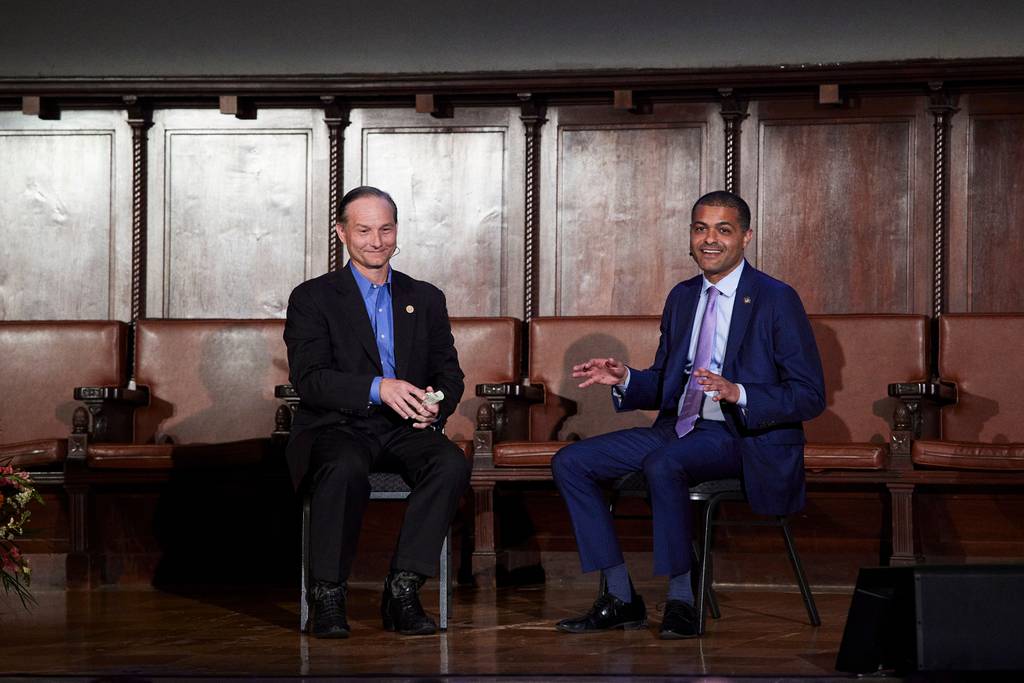The Department of Veterans Affairs’ top health official on Friday said the agency is prepared to spend “at least in the millions” of dollars on clinical trials of psychedelic therapies, pending a U.S. Food and Drug Administration decision on midomafetamine, or MDMA, assisted treatments expected later this year.
VA Under Secretary Shereef Elnahal’s comments were delivered to conference attendees during a conversation with Jason Pyle, executive director of Healing Breakthrough, an organization working to treat veteran PTSD through MDMA-assisted therapy.
Elnahal discussed how the VA will play a pivotal role in answering more specific questions surrounding psychedelic therapies, such as the extent of treatment necessary to have an impact on veterans.
Further researching just how intensive these therapies have to be will better prepare the VA to respond to the surge in demand they expect following potential approval by the FDA, Elnahal said.
“We can start to answer some of the questions that the broader clinical and scientific community has,” Elnahal said. “Do you actually need eight hours every three sessions for an MDMA therapy? Do you actually need two clinicians per patient for that duration?
“The moment the FDA approves MDMA … we’re going to see demand for this go through the roof, especially among the veteran population.”
Elnahal also noted the VA would like to study the possibility and effectiveness of group therapy sessions.
Preparations also include understanding what a treatment must entail to be the most medically — and economically — effective.
On the table, too, is expanding to other therapies, such as ibogaine and psilocybin, he added.
“This initial request for proposals is supposed to be the spark that fuels even more research,” Elnahal said. “Chances are that — because of the similar mechanisms of action, similar effect areas in the brain — we can see unique benefits of some of these other compounds. We’re proving the case that the federal government is no longer afraid to engage in this.”
A second phase III trial by Lykos Therapeutics, formerly the MAPS Public Benefit Corporation, found more than 86% of participants who received the MDMA-assisted therapy for PTSD experienced “clinically meaningful” improvement 18 weeks after starting the trial.
More than 71% of participants who participated in MDMA-assisted therapy no longer met the diagnostic criteria for PTSD at the end study, compared to just over 46% of participants who had the placebo plus therapy. The VA is currently conducting 13 multisite clinical trials, Elnahal told the audience.
In February 2024, MDMA received a fast-track review from the FDA, a designation given to the most promising treatment methods. The FDA in 2017 designated MDMA as a “breakthrough therapy” for treatment of PTSD. Psilocybin, also known as magic mushrooms, to treat anxiety and depression received that designation in 2019.
Elnahal noted that the risk potential for psychedelics is lower than existing treatments approved by the FDA to treat PTSD and other mental health issues veterans face.
The VA — with FDA approval — will push to have the treatment available to veterans across the country, regardless of background, Elnahal said. He told attendees he wanted to avoid disparities that traditionally arise with promising treatments.
“A dynamic that you often see with new and innovative therapies is that they asymmetrically go to populations that have more means, and you immediately start to see this dynamic of a disparity,” Elnahal said.
“We could prove the case that, for the first time, a new and innovative therapy does not have that disparity associated with it.”
Zamone “Z” Perez is a reporter at Military Times. He previously worked at Foreign Policy and Ufahamu Africa. He is a graduate of Northwestern University, where he researched international ethics and atrocity prevention in his thesis. He can be found on Twitter @zamoneperez.
Military Times © 2024
Military Times © 2024
Psychedelic therapy data ‘speaks for itself,’ VA official says – Military Times
